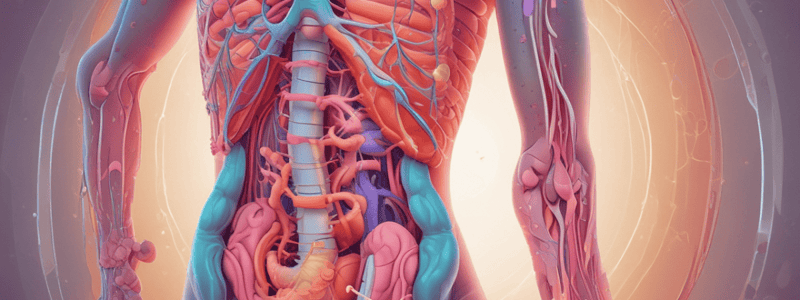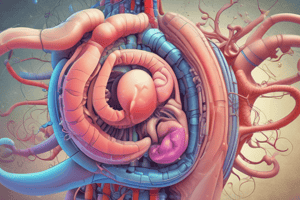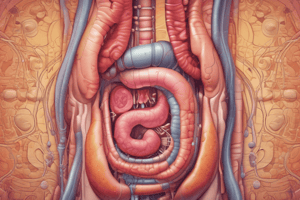Podcast
Questions and Answers
What is the primary function of somatostatin in the stomach and intestine?
What is the primary function of somatostatin in the stomach and intestine?
- Promote the secretion of secretin
- Increase the secretion of gastric acid
- Stimulate the release of gastrin
- Suppress the release of pancreatic hormones (correct)
During the cephalic phase of gastric acid secretion, what is the primary mediator released by the vagus nerve?
During the cephalic phase of gastric acid secretion, what is the primary mediator released by the vagus nerve?
- Gastrin
- Histamine
- Acetylcholine (Ach) (correct)
- Somatostatin
Which type of cells are directly stimulated by acetylcholine (Ach) to release histamine during gastric acid secretion?
Which type of cells are directly stimulated by acetylcholine (Ach) to release histamine during gastric acid secretion?
- Parietal cells (correct)
- G cells
- Delta cells
- ECL cells
What initiates the same mechanisms of gastric acid secretion seen in the cephalic phase during the gastric phase?
What initiates the same mechanisms of gastric acid secretion seen in the cephalic phase during the gastric phase?
Which stimulus causes G cells to produce gastrin during gastric acid secretion?
Which stimulus causes G cells to produce gastrin during gastric acid secretion?
What is the primary function of the parietal cells located in the apical region of the stomach?
What is the primary function of the parietal cells located in the apical region of the stomach?
Which type of cells located in the lower regions of gastric glands are responsible for synthesizing proteins?
Which type of cells located in the lower regions of gastric glands are responsible for synthesizing proteins?
During stomach motility, what is the function of the churning stage?
During stomach motility, what is the function of the churning stage?
Which type of enteroendocrine cells located deep within gastric pits secrete histamine?
Which type of enteroendocrine cells located deep within gastric pits secrete histamine?
What is the primary function of the muscularis externa layer in the stomach?
What is the primary function of the muscularis externa layer in the stomach?
Which cell is responsible for the release of gastric acid?
Which cell is responsible for the release of gastric acid?
What is the primary function of gastric acid in the stomach?
What is the primary function of gastric acid in the stomach?
Which of the following substances stimulates the secretion of gastric acid in the stomach?
Which of the following substances stimulates the secretion of gastric acid in the stomach?
What is the role of the H+/K+ ATPase enzyme in the secretion of gastric acid?
What is the role of the H+/K+ ATPase enzyme in the secretion of gastric acid?
Which class of drugs is used to inhibit the secretion of gastric acid by blocking the H+/K+ ATPase enzyme?
Which class of drugs is used to inhibit the secretion of gastric acid by blocking the H+/K+ ATPase enzyme?
Which type of cells in the stomach are primarily responsible for producing stomach acid?
Which type of cells in the stomach are primarily responsible for producing stomach acid?
What is the process called when contractions in the pyloric antrum 'grind' the food bolus?
What is the process called when contractions in the pyloric antrum 'grind' the food bolus?
What is the purpose of the migrating motor complex in the stomach?
What is the purpose of the migrating motor complex in the stomach?
What is the term for the opening of the pylorus that allows contents to enter the duodenum?
What is the term for the opening of the pylorus that allows contents to enter the duodenum?
Which event occurs as a result of signals from the stomach and duodenum to regulate the rate of gastric emptying?
Which event occurs as a result of signals from the stomach and duodenum to regulate the rate of gastric emptying?
What is the primary mechanism that protects the gastric mucosa from the damaging effects of gastric acid?
What is the primary mechanism that protects the gastric mucosa from the damaging effects of gastric acid?
Which of the following is NOT a symptom of acute gastritis?
Which of the following is NOT a symptom of acute gastritis?
Which of the following is a risk factor for peptic ulcer disease?
Which of the following is a risk factor for peptic ulcer disease?
What is the primary cause of chronic gastritis?
What is the primary cause of chronic gastritis?
Which of the following is a complication of peptic ulcer disease?
Which of the following is a complication of peptic ulcer disease?
Which cell type is primarily involved in the protection of the gastric mucosa against the damaging effects of gastric acid?
Which cell type is primarily involved in the protection of the gastric mucosa against the damaging effects of gastric acid?
Which pathological condition is characterized by erythematous antral mucosa with large amounts of plasma cells and increased levels of lymphocytes, macrophages, and neutrophils in the lamina propria during chronic H. pylori gastritis?
Which pathological condition is characterized by erythematous antral mucosa with large amounts of plasma cells and increased levels of lymphocytes, macrophages, and neutrophils in the lamina propria during chronic H. pylori gastritis?
What is the primary diagnostic method for detecting chronic H. pylori infection that does not involve invasive procedures?
What is the primary diagnostic method for detecting chronic H. pylori infection that does not involve invasive procedures?
Which type of cells are primarily involved in the secretion of pepsinogen, which is subsequently converted to pepsin in the stomach?
Which type of cells are primarily involved in the secretion of pepsinogen, which is subsequently converted to pepsin in the stomach?
Which of the following pathological conditions is not associated with chronic H. pylori gastritis?
Which of the following pathological conditions is not associated with chronic H. pylori gastritis?
Which factor contributes the most to the development of peptic ulcer disease in the context of H. pylori infection?
Which factor contributes the most to the development of peptic ulcer disease in the context of H. pylori infection?
What is a characteristic feature of the base of a peptic ulcer?
What is a characteristic feature of the base of a peptic ulcer?
Which of the following best describes the difference between the pain patterns of duodenal and gastric ulcers?
Which of the following best describes the difference between the pain patterns of duodenal and gastric ulcers?
What is the most likely symptom of a gastric ulcer in the context of peptic ulcer disease?
What is the most likely symptom of a gastric ulcer in the context of peptic ulcer disease?
Which treatment approach is the most important for managing peptic ulcer disease caused by H. pylori infection?
Which treatment approach is the most important for managing peptic ulcer disease caused by H. pylori infection?
Flashcards are hidden until you start studying
Study Notes
Stomach Anatomy and Physiology
- The stomach is a J-shaped enlargement of the GI tract directly inferior to the diaphragm in the abdomen
- It is the most distensible part of the GI tract, accommodating a large quantity of food
- The stomach serves as a reservoir for food before release into the small intestine
- It mixes saliva, food, and gastric juice to form chyme
Stomach Regions and Sphincters
- The stomach has four main regions: cardia, fundus, body, and pylorus
- There are two sphincters: lower esophageal and pyloric
- Two main curvatures: lesser and greater
Stomach Histology
- The stomach lining consists of mucosa, submucosa, muscularis externa, and serosa
- Gastric glands are found in the mucosa and contain:
- Chief cells (zymogenic) that secrete pepsinogen
- Enteroendocrine cells that secrete histamine, gastrin, and somatostatin
- Submucosa consists of dense, irregular collagenous connective tissue with a rich vascular and lymphatic network
- Muscularis externa has three layers: inner oblique, middle circular, and outermost longitudinal
- Serosa is the outermost layer
Stomach Motility
- There are four stages of stomach motility:
- Food entry into the stomach
- Storage in the fundus
- Mixing (churning)
- Emptying into the small intestine
- Mixing waves are initiated by gastric pacemakers and increase in magnitude as they approach the pyloric antrum
- The pyloric antrum "grinds" the food bolus, and the contents are forced into the pylorus under high pressure
Stomach Secretions
- Gastric acid secretion is higher after meals and lower between meals
- There are three phases of gastric acid secretion after meals:
- Cephalic phase: triggered by smell, sight, taste, and thought of food
- Gastric phase: food enters the stomach, stimulating the vagus nerve and local enteric nervous system
- Intestinal phase: partially digested proteins stimulate G cells to produce gastrin
- Gastric acid is composed of hydrochloric acid, potassium chloride, and small amounts of sodium chloride
- Functions of gastric acid include digestion of proteins, bacteriostatic effects, and conversion of pepsinogen to pepsin
Peptic Ulcer Disease
- Peptic ulcer disease is caused by:
- Decreased bicarbonate secretion in the duodenum
- Increased gastric acid secretion in the stomach
- Pathology: round to oval-shaped defects in the mucosa, with a smooth base and granulation tissue
- Clinical features: vague, intense pain, relieved by food (duodenal ulcers) or poorly relieved by food (gastric ulcers)
- Treatment includes withdrawing offending agents, eradicating H. pylori, and treating symptoms
H. pylori Infection
- H. pylori infection is associated with chronic gastritis and peptic ulcer disease
- Pathogenesis: H. pylori increases local gastric acid production, leading to increased risk of peptic ulcers
- Pathology: erythematous antral mucosa with inflammation and atrophy
- Clinical features: asymptomatic, epigastric pain, nausea, vomiting, anorexia, and weight loss
- Diagnosis: presence of antibodies in serum, fecal bacteria detection, and urea breath test
Studying That Suits You
Use AI to generate personalized quizzes and flashcards to suit your learning preferences.



